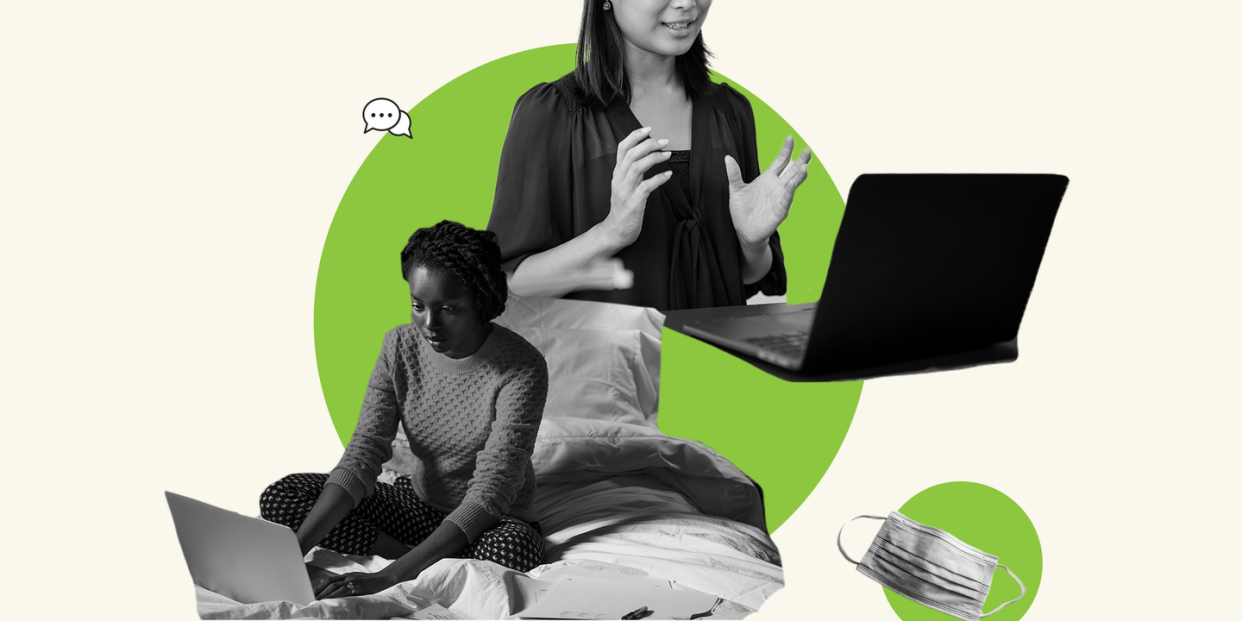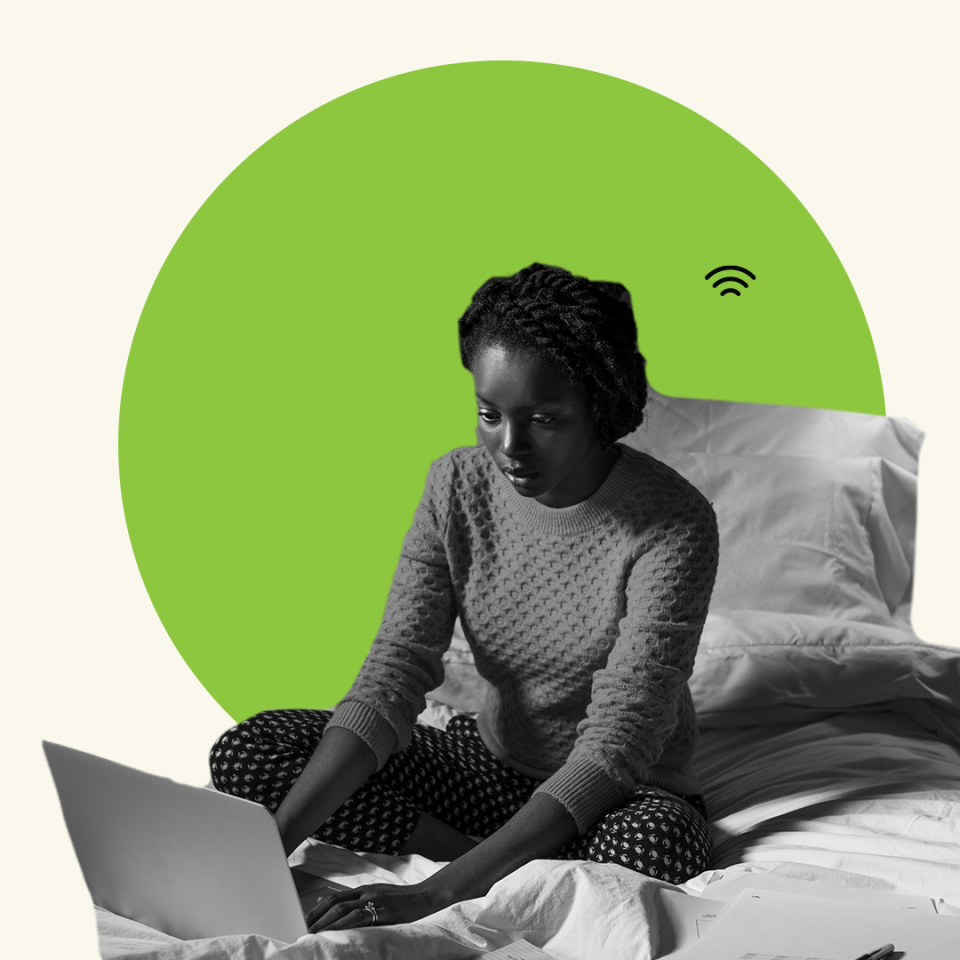What Does a Work-Life Culture Expert Think About the (Very Messy, Pretty Stressful) WFH Debate?

- Oops!Something went wrong.Please try again later.
"Hearst Magazines and Yahoo may earn commission or revenue on some items through the links below."
As you’ve likely noticed, there’s a debate raging across corporate America about the Future of Work. Some companies want their people in the office five days a week, Delta variant be damned. Others (ahem, tech companies) have decided to offer employees a permanent remote option, making a gamble that such flexibility will help attract and retain talent. A third category features all the companies participating in the headache-inducing dance of settling on a start date for a hybrid WFH/office sitch—only to delay the new schedule…indefinitely.
And in the media, the two camps of the debate are being painted with the broadest of strokes, with millennials and Zoomers on one side of the aisle, insisting on their right to never put on real pants again, and Boomers on the other, claiming that “real work” can happen only in the confines of a climate-controlled cubicle.
But enough shouting on Twitter about the joys of forgoing underwire—is working from home even…working for us anymore? Cosmopolitan asked Anne Helen Petersen, author of Can’t Even: How Millennials Became the Burnout Generation, who happens to be writing her next book, Out of Office: The Big Problem and Bigger Promise of Working From Home, on this very subject. Here are highlights from our conversation, and long story short—there’s no one-size-fits-all-workplaces ideal. But one thing’s for sure: Management should offer employees some flexibility and not just think about the company’s needs.
Yes, sweatpants are great, but is working from home actually accessible for everyone?
It depends on the individual job and what your living situation is. It’s so much harder to work from home if you’re in a tiny New York apartment that you’re sharing with someone else who’s also working from home. When you’re home all the time, it’s not even the smallness that makes it difficult so much as the lack of discrete spaces.
Steady internet access is also a huge issue. There are still a lot of places where it’s hard to get reliable internet. It might be hard for people in cities to imagine, but it’s very true in more rural areas—even in places like upstate New York, for example.
Can you talk a little bit about working from home as a disability rights issue?
If you talk to disability rights activists, there’s actually a ton of frustration that we’ve moved so seamlessly into working from home when they’ve been trying to figure out how to make it an option since before the pandemic. It’s important to acknowledge that disability rights activists have been advocating for working from home for so long but no one was listening.
Permanent flexibility is a great way to make work possible for a whole bunch of people who aren’t able to go into the office from 9 to 5 every day. These can be people who have chronic fatigue or people who can’t sit upright for the entirety of the day, but it can also be people whose parenting or caregiving schedules dictate that they need to be at home for part of the day. To echo some of the disability experts I’ve spoken with, it’s about universal design in terms of making work more accessible to more people.
Given that, why didn’t corporate America offer flexible options pre-pandemic?
I think a lot of it was inertia. Until someone—or something—forces the status quo to change, it’s like steering a massive barge that takes forever. What happened seemingly overnight during the pandemic was essentially just an accelerated change that was already happening very slowly—whether it was people working from home on Fridays or people having more flexible work schedules in the mornings.

Losing your commute is great, but rolling out of bed and into your office on the couch can definitely blur the boundaries of maintaining work-life balance.
This is a huge issue! It was especially difficult when we were deep in the throes of the pandemic and people didn’t have much else to do. I use the term “one endless Wednesday.” There was no bumper between heading into work and starting your workday or coming back home and having that space where you can mentally detach from work.
But now that we all have a clearer understanding of how work from home works, and with most offices offering some form of flexible work options, people are going to have to start figuring out how to institute boundaries. Additionally, companies have to figure out how to encourage and incentivize boundaries, because people become worse workers when they work all the time.
What do you think about the argument that people who work from home aren’t as “productive” because they’re not in the same headspace as they would be if they were working from an office?
That argument is made by people who think that the only way to make workers work is surveillance. There’s overwhelming evidence that productivity went up during the pandemic, so that’s not the problem. The problem is, now, after that spurt of activity, people are trying to deal with the effects of burnout, which do decrease productivity.
People are also figuring out how to keep working from home in a way that is equitable, so it’s not that men will go into the office and women will still work from home because of things like childcare or that only managers will go into the office. There’s a worry that we’ll step backward from years of women making successful inroads in terms of promotion and equity in the office. That’s what I’m really concerned about—not productivity.
Do people who permanently WFH lose out on the social element of work? Hanging out with coworkers, going out to lunch, that sort of thing?
One thing that companies have historically encouraged is making you work so much that your only friends are the people you know in the office—which is really just a sneaky way to make you work all the time.
But working from home doesn’t mean you have to work by yourself all the time—you can have friends over, you can work in common spaces, you can go to the library. It’s not what working from home was in December of 2020. I work with my friends all the time—that way, I’m socializing and I’m with people, just not necessarily with my coworkers. There’s nothing wrong with being friends with your coworkers, but this allows me to actually cultivate the friendships that I always felt I had no time to cultivate otherwise.

Friends of mine are worried about falling behind in their careers if they continue to work remotely. Is face time with your manager a must if you’re working to nab a promotion or secure a raise?
I think it’s hard for people who are early in their careers or have just started a new job, but it’s not impossible. All that’s needed is a conscious company that sets up new employees in a way that allows them to communicate with other people and have access to mentors. Companies should consciously pair people with mentors and not leave it to a buddy system, and they should give people the space to actually have that mentorship relationship.
There’s some concern that working from home puts older employees at a disadvantage. Is this true? Do younger people have an easier time working from home?
I think it really is much more about your position in the office and less about age. I do think millennials are more comfortable with working from home just because we are more digitally native. That’s the real crux of it—whether or not you feel comfortable with digital communication. For me, I know how to communicate in Slack messages because I have been communicating in group threads for years. And before that, I knew how to use AOL messenger. These tools and styles of communication are very familiar to millennials and Gen Zers and to some younger Gen Xers too. But those things do not feel as familiar to older Gen Xers and Boomers unless they’ve specifically sought them out. I’ve also seen older people who enjoy working from home, so I think framing it as a generational debate loses some of the nuance. A lot of it is about familiarity, power, and management versus nonmanagement.
Okay, and now for the big Q. Knowing all this, what should we as individual employees do? Seek out companies that are offering the working lifestyle that best suits us?
People have to figure out whether or not they have flexibility to switch jobs or look for a new job or even switch careers (see, for example, people who are academics and stuck in pretty crappy situations when it comes to being back in the classroom without mask or vaccine mandates). You might not be able to just quit your job and spend months looking, but you could start looking while still in your current job—for jobs that have more flexibility, for jobs that allow a hybrid scenario, for jobs with managers who seem to be listening to their employees’ desires.
This is, of course, a privilege available to people doing the sort of work that can be done remotely in the first place. But in this day and age, your job is likely more than just a 9-to-5—it’s going to dictate the rhythms of your life moving forward. What do you want? How do you work best? How can you try to find a job that fits better with those desires? Those are the questions employees need to be asking themselves.
This interview has been edited and condensed for clarity.
You Might Also Like

